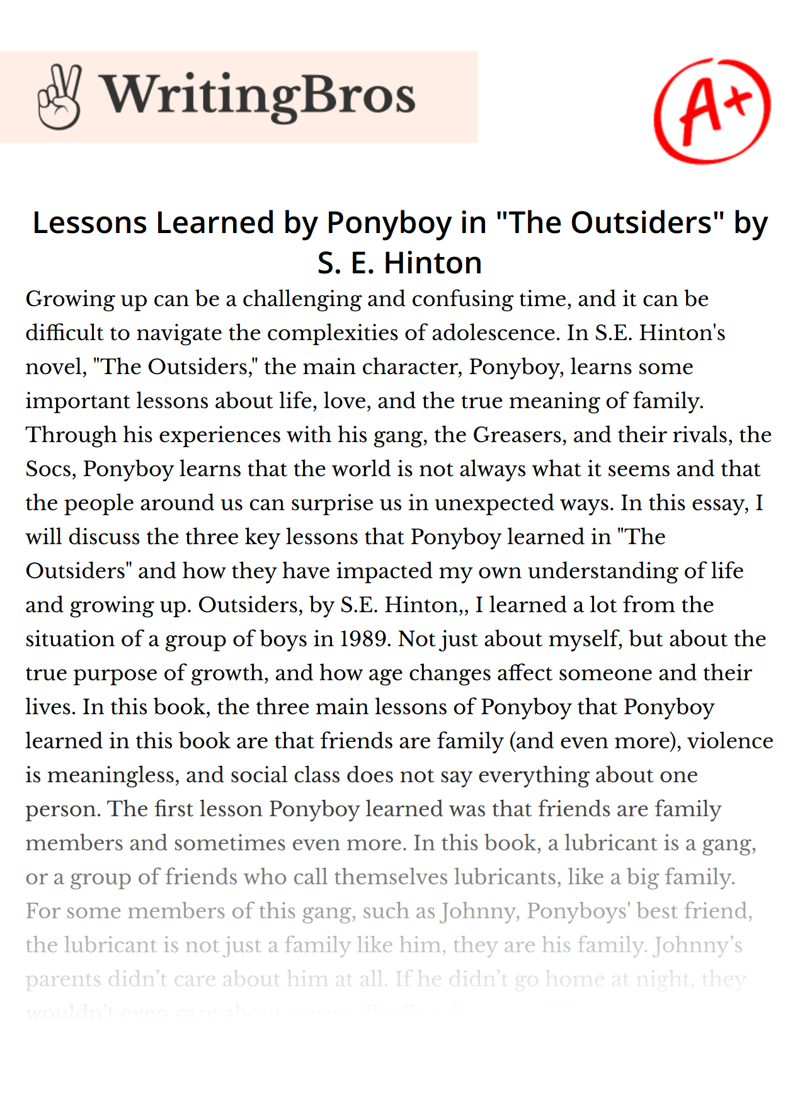Lessons Learned by Ponyboy in "The Outsiders" by S. E. Hinton

Growing up can be a challenging and confusing time, and it can be difficult to navigate the complexities of adolescence. In S.E. Hinton's novel, "The Outsiders," the main character, Ponyboy, learns some important lessons about life, love, and the true meaning of family. Through his experiences with his gang, the Greasers, and their rivals, the Socs, Ponyboy learns that the world is not always what it seems and that the people around us can surprise us in unexpected ways. In this essay, I will discuss the three key lessons that Ponyboy learned in "The Outsiders" and how they have impacted my own understanding of life and growing up.
Outsiders, by S.E. Hinton,, I learned a lot from the situation of a group of boys in 1989. Not just about myself, but about the true purpose of growth, and how age changes affect someone and their lives. In this book, the three main lessons of Ponyboy that Ponyboy learned in this book are that friends are family (and even more), violence is meaningless, and social class does not say everything about one person.
The first lesson Ponyboy learned was that friends are family members and sometimes even more. In this book, a lubricant is a gang, or a group of friends who call themselves lubricants, like a big family. For some members of this gang, such as Johnny, Ponyboys' best friend, the lubricant is not just a family like him, they are his family. Johnny’s parents didn’t care about him at all. If he didn’t go home at night, they wouldn’t even care about grease. Really take care of him and show / give him a real family. As Ponyboy sees, he realizes that you don't need to connect with the family through blood or law, but through love.
The second lesson Ponyboy learned was that violence was meaningless. Throughout the book, ponyboy often asks why he wants to fight and never thinks of a reasonable answer. So in the end, he started asking other lubricants why they were fighting. The only answer he really got was 'because it's fun' or 'because I'm angry.' Finally, Ponyboy realized that the violence was wrong and usually didn't solve any problems.
Perhaps the most important lesson Ponyboy learned during his growth was that the social class did not say anything about one person. Ponyboy's gang, there is a real enemy, Socs. Society is another from the other side of the town. Crew. They are richer than grease and can get everything they want. They rode on fancy wild horses to show off and beat small grease whenever they have a chance.
In three-quarters of the book, Ponyboy hates socialism. Ponyboy thinks they are so mean because they are rich. Finally, he learned that this was not the case. He talked to some former social people and realized that most of them are very kind people, only a few people do bad things, only when they are drunk. Ponyboy knows that the social class does not necessarily tell you about a certain Everything about man.
After reading the outsiders, S.E. Hinton, I have learned a lot about growing up, growing up and how others experience it. In this book, the protagonist, Ponyboy and his best friend Johnny have experienced some amazing and unforgettable experiences, all of which boil down to the classic maturity/growth story. In all these crazy experiences, Ponyboy learned Three new important life courses; friends are families, violence usually does not solve any problems, and social class should not let one judge another.
References
- Hinton, S. E. (1967). The Outsiders. Viking Press.
- Conard, M. T. (2009). Understanding S.E. Hinton. University of South Carolina Press.
- Dettmar, K. J. H. (Ed.). (2009). The Cambridge Companion to American Modernism. Cambridge University Press.
- Ebert, R. (1998, March 27). The Outsiders. Chicago Sun-Times. https://www.rogerebert.com/reviews/the-outsiders-1983
- Healey, J. F. (2013). Race, Ethnicity, Gender, and Class: The Sociology of Group Conflict and Change. SAGE Publications.
- Hill, M. J. (2012). The Outsiders. Salem Press Encyclopedia of Literature.
- Smith, J. (2003). The Outsiders. St. James Encyclopedia of Popular Culture.
Cite this Essay
To export a reference to this article please select a referencing style below

